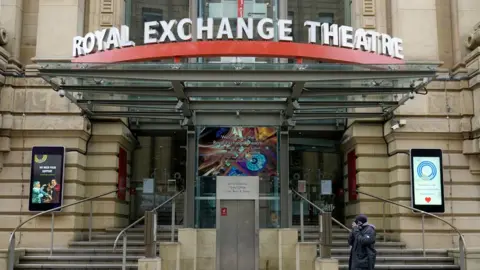Union criticises 'censorship' after play cancelled
 Getty Images
Getty ImagesArts union Equity has criticised a "growing culture of censorship" after a play was cancelled, reportedly in a dispute over references to the Israel-Gaza war and trans rights.
The Royal Exchange, Manchester's main producing theatre, has scrapped its entire five-week run of a modern retelling of Shakespeare's A Midsummer Night's Dream.
Equity said it was "deeply frustrated" at the lack of transparency over the cancellation, and that it was speaking to theatre bosses to "protect the principle of artistic freedom".
The theatre has said it wants "to work with artists who address complex issues" but the play faced "a number of challenges".
It said those challenges included "injuries, a delayed technical week and changes late in the process".
The Manchester Evening News reported that the show, set in the city's present-day rave scene, was axed after managers objected to a song with lyrics that referred to trans rights and the phrase "free Palestine".
Theatre news outlet The Stage reported that one of the points of contention was "free Palestine" being daubed on the set as well as featuring in a rap.
Equity said union officials met the theatre's management on Wednesday and "received assurances that they take our concerns seriously".
A statement said: "While we welcome the engagement, we remain deeply frustrated by the lack of transparency regarding the events leading to the cancellation of A Midsummer Night’s Dream.
"For Equity, this is an issue of dignity at work and freedom of expression. We absolutely back the rights of our members – performers, stage management, creative team and all involved in the production – to be treated with dignity and respect at work.
"We reject the growing culture of censorship created by funders and pressure groups. We are fighting for artistic integrity, as well as dignity for our members, and all working people.
"We remain in conversation with Royal Exchange management to protect the principle of artistic freedom, guarantee our members’ dignity at work, and ensure the integrity of our collective agreements."
A theatre spokesperson said: "At the Royal Exchange Theatre we want to work with artists who address complex issues.
"Sadly, in A Midsummer Night’s Dream a number of challenges occurred which led to a decision to cancel the production - including injuries, a delayed technical week and changes late in the process.
"Despite our best efforts we were unable to get the show on as planned and took the difficult decision to cancel the production. Every effort was made to get the production on stage."
The show's director Stef O'Driscoll and cast have not commented on the reasons for the cancellation.
The decision has damaged the theatre's credibility among some observers.
Actor Giovanni Bienne, a member of Equity's LGBT+ committee, wrote on X: "Every director worth their salt who wants to address 'complex issues' will laugh and spit in the @rxtheatre's face whenever they try to hire them.
"Working there will make you an establishment stooge. And who wants that reputation."
Denise Fahmy, who co-founded the group Freedom in the Arts, wrote: "The production sounds dreadful - perhaps that’s the reason @rxtheatre cancelled it - but once commissioned, shouldn’t audiences decide whether to see it or not?"
The venue receives £2.4m a year from Arts Council England, the body's third-highest annual theatre grant, behind the National Theatre and Royal Shakespeare Company.
A spokesperson for Arts Council England said all recipients of funding "remain fully responsible for their operations, artistic programme, and the day-to-day management of their activities".
The Greater Manchester Combined Authority, one of the theatre's other main funders, said it was "in conversation with the Royal Exchange to better understand the situation" and that all cultural bodies it funds "retain full responsibility for the artistic direction of their programmes and the operational management of their organisations".
Last year, the Royal Exchange scrapped its artistic director post and replaced it with a less senior creative director role.
